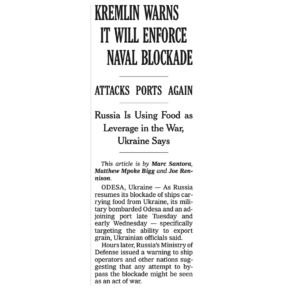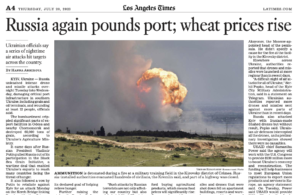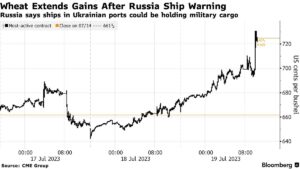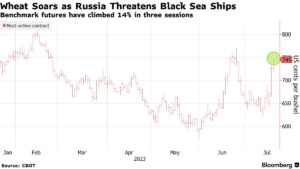Tariffs imposed by the Trump administration collected an estimated $958 million in revenue from selected agricultural inputs from February to October of 2025, according to North Dakota State University's monthly…
Wheat Soars as Russia Threatens Ships; Ports Hit For Third Straight Night
Bloomberg writers Megan Durisin, and Aliaksandr Kudrytski reported yesterday that, “Wheat and corn rallied to three-week highs as another wave of Russian attacks battered southern Ukraine following the collapse of the grain-export deal.
“Shelling on Tuesday and Wednesday hit agriculture terminals in the ports of Odesa and Chornomorsk, according to the agriculture ministry. The damage knocked out a ‘significant part‘ of Chornomorsk’s grain-export infrastructure and destroyed 60,000 tons of grain there.”
Marc Santora, Matthew Mpoke Bigg and Joe Rennison reported on the front page of today’s New York Times that, “On Tuesday, Moscow denied that the previous night’s barrage was related to the just-suspended grain deal, calling it a ‘mass retaliatory strike’ on facilities used to manufacture attack drones, particularly the naval drones used in an assault on Monday on the bridge linking Russia to the Russian-occupied Crimean peninsula.”

And Associated Press writer Hanna Arhirova reported in today’s Los Angeles Times that, “Ukraine’s Agriculture Ministry, citing experts, estimated that it would take a year to restore the facilities damaged Wednesday. The destroyed grain was supposed to have been loaded onto a vessel and sent through the grain corridor two months ago, the statement said.”

Yesterday, Bloomberg writers Aine Quinn, Megan Durisin, and Michael Hirtzer reported that, “Wheat futures soared as much as 9%, the biggest jump since 2012, as Russia threatened ships sailing to Ukrainian ports, escalating a conflict over exports from the key Black Sea region.”

The article noted that, “‘We saw it as unlikely that the grain deal would continue, but this is escalatory — after a number of escalations we’ve already seen,’ said Michael Magdovitz, a senior analyst at Rabobank in London. Ukrainian farmers’ crops are ‘coming to harvest at the very time when their export capacity is being shut off,’ he said.”
More narrowly on Russia’s threat, Financial Times writer Roman Olearchyk reported yesterday that, “Russia has warned it will treat all vessels heading to Ukraine’s ports as military threats, signalling its intent to reimpose a naval blockade on Ukraine in a move that sent European and US grain futures soaring.”
‘All vessels heading to Ukrainian ports in Black Sea waters will be regarded as potentially carrying military cargo,’ the Russian defence ministry said on Wednesday. ‘The countries whose flags such vessels are carrying will be regarded as ones involved in the Ukrainian conflict on the side of Kyiv.’
Bloomberg writer Jennifer Jacobs reported yesterday that, “The Russian military could attack civilian shipping in the Black Sea as part of its effort to target Ukrainian grain facilities, Biden administration officials said Wednesday, citing new intelligence.
“‘Our information indicates that Russia laid additional sea mines in the approaches to Ukrainian ports,’ National Security Council spokesman Adam Hodge said in a statement. ‘We believe that this is a coordinated effort to justify any attacks against civilian ships in the Black Sea and lay blame on Ukraine.'”
Also yesterday, Bloomberg’s Olesia Safronova, and Megan Durisin reported that, “Ukrainian crops will still make it to global markets, squeezed out through river ports and across the European Union border. In some ways, those routes provide more stability than the corridor, which was plagued by slow ship-inspection times and hefty demurrage fees for late loading during its operation.
“Standing in Odesa, Ukraine Infrastructure Minister Oleksandr Kubrakov estimated the Danube River alone could handle 23 million to 25 million tons of foodstuff exports this year, far more than usual and about half of the country’s annual prewar grain exports. USAID has pledged investments to boost capacity.”
With respect to grain moving of the EU border, Financial Times writers Raphael Minder, Barbara Erling and Andy Bounds reported yesterday that, “Poland and four other EU member states asked Brussels on Wednesday to extend trade curbs on Ukrainian grain amid concerns that Russia’s blockage of Black Sea shipments could put further pressure on their domestic markets.
“Poland, Hungary, Slovakia, Bulgaria and Romania have restricted imports of Ukrainian grain since last spring in response to protests by their farmers about a grain glut that sent cereal prices crashing and which they blamed on Ukrainian imports.
“In May, Brussels persuaded them to drop unilateral measures, which violated EU trade law, by agreeing that Ukrainian shipments would only transit through the five countries on route to other destinations. The EU also handed out €100mn to the affected countries.”
Reuters News reported today that, “Germany is working with allies to ensure that Ukrainian grain is not left to rot in silos after Russia pulled out of an export deal, and will intensify work on getting the grain out by rail, Foreign Minister Annalena Baerbock said on Thursday.”
"Putin is using hunger as a weapon"
— Bloomberg TV (@BloombergTV) July 19, 2023
The Kremlin's decision to terminate the Ukraine grain-export deal puts lives at risk, EU foreign policy chief Josep Borrell says https://t.co/sdrCgZB6PS pic.twitter.com/KDu9eLoLNp
Elsewhere, Reuters News reported yesterday that, “President Vladimir Putin on Wednesday accused Western countries of perverting the expired Black Sea grain deal for their own ends, but said Russia would immediately return to the agreement if all its conditions were met.”
Wheat prices are surging as Russia threatens to attack civilian grain ships sailing to Ukrainian ports
— Bloomberg TV (@BloombergTV) July 20, 2023
Keira Wright has the latest https://t.co/ytg4G6nt6U pic.twitter.com/6sT7H4RJ6J
However, Financial Times writer Roman Olearchyk reported today that,
Russia’s invading forces hammered Ukraine’s port cities in a third consecutive night of air strikes, causing casualties and further dashing hopes on rattled grain markets that Ukrainian exports could be rebooted.
“Ukrainian authorities said the attacks had caused an unclear number of deaths and at least 23 injuries.”
Odesa. Mykolaiv. Russian terrorists continue their attempts to destroy the life of our country.
— Володимир Зеленський (@ZelenskyyUa) July 20, 2023
Unfortunately, there are wounded and dead... My condolences to the families and friends!
But the evil state has no missiles that are more powerful than our will to save lives, support… pic.twitter.com/CPcq8AmFoh
Reuters writer Viktoria Lakezina reported today that, “Russia attacked Odesa and Mykolaiv on Thursday in a third successive night of air strikes on southern Ukrainian port cities, killing one person and wounding at least 27, Ukrainian officials said.”

Reuters writer Naveen Thukral reported today that, “Chicago wheat futures rose 1.6% to hit a three-week high on Thursday, supported by growing expectations that an attack on Ukrainian ports after Russia’s withdrawal from a Black Sea export deal will have longer-term impact on global supplies.”
“‘Russia’s overnight attack on infrastructures at the port of Odesa will have served to remind participants and observers as to the risks involved in maintaining Black Sea trade flows without a guarantee of safety,’ BMI Research, a unit of Fitch Group, said in a note.”





